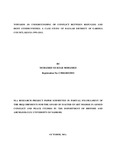| dc.description.abstract | Refugee-host conflict is not a recent phenomenon in Kenya. Its origin in the Kenyan history can
be traced way back to the emergence of colonization. For long, Kenya was one of a few African
States which have acted as home to many refugees. For instance since the late eighties, Kenya
experienced an increasing influx of displaced people, as a result of the continued conflict in
Uganda after 1986, and later in Ethiopia and Somalia 1990-91, saw the crossing of 400,000
Somalis Refugee combined with the arrival of a large group of Sudanese young men who came
walking from Ethiopian camps after their stay there was no longer safe. Initially up to 1990, the
attitude and response of national governments towards refugee presence consisted of active
hostility and the passing of tough, stringent regulations to restrict refugee movement to
designated camps. Since 1991/1992 however, governments were forced to acknowledge refugees
because Kenya is a signatory to the UN conventions on rights of Refugees. The refugee had a
right to being hosted in a safe environment where the international community can access them.
The continued existence of the problem of refugees has posed many questions to scholars
regarding the mechanism of managing refugees in host countries like Kenya. This is,
particularly, so considering the complex interactions between the local community and the
refugees, land and housing markets as well as the legal, economic and cultural forces at play.
Considering the fact that the refugees exist within the social structure of the host country, this
study used available empirical evidence documented data, and the related experiences of
informant on conflict between the refugees and the host community. Information particularly on
land use helped in gaining an understanding of social, economic, racial or ethnic, legal, political
and cultural divides that have contributed to conflict between the refugees and their hosts. The
consequences of these dynamics and other implications of sustaining refugees as well as the
challenges encountered in the sustainability of refugee’s programmes and possible policy
directions are highlighted. The study concludes that good land management is crucial for the
achievement and promotion of effective functioning of relationship between refugees and their
host in order to sustain and boost the social, economic, physical and cultural well being of all
parties concerned. | en_US |

